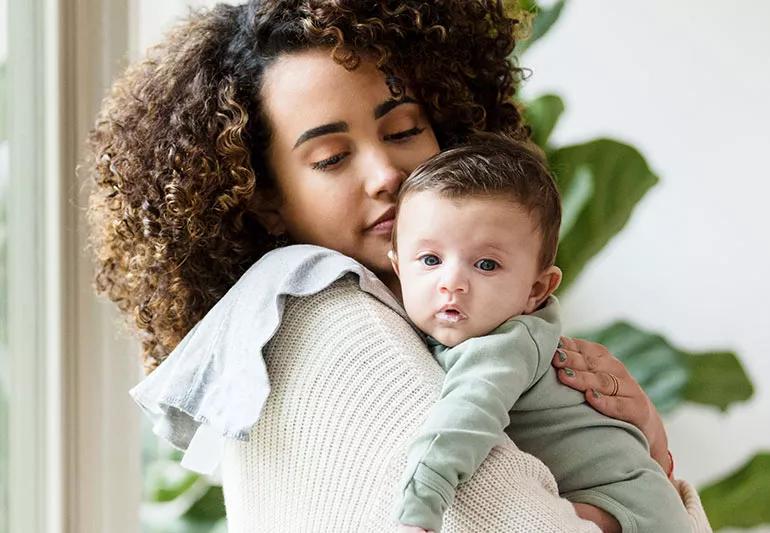What causes newborn hiccups — and how to stop them

Your brand new baby has a serious case of hiccups. And while they’re a little bit adorable, you’re also wondering if there’s any cause for concern.
Advertisement
Cleveland Clinic is a non-profit academic medical center. Advertising on our site helps support our mission. We do not endorse non-Cleveland Clinic products or services. Policy
“Baby hiccups are very common, and they aren’t normally a problem,” says pediatrician Kylie Liermann, DO. “In fact, they usually bother parents more than the baby.”
To calm your new parent nerves a little, Dr. Liermann explains what causes baby hiccups and how to get rid of them so you (and baby) can breathe easier.
Hiccups are most likely caused by irritation to the diaphragm, the muscle at the base of the lungs. Sometimes, that muscle starts to spasm or cramp. That causes the vocal cords to clamp shut, creating that distinctive “hic!” sound you know and dread.
Developing babies can get hiccups even before they’re born, and many pregnant women have felt the telltale flutters in their bellies.
Hiccups are especially common in newborns and infants. “We don’t know exactly why, but hiccups may be caused by increased gas in the stomach,” Dr. Liermann says. “If babies overfeed or gulp air during eating, that could cause the stomach to expand and rub against the diaphragm, generating those hiccups.”
Usually, hiccups don’t bother babies. But sometimes, hiccups are a sign of gastroesophageal reflux (GERD). Reflux causes stomach acid to back up into the baby’s esophagus.
If your baby has GERD, hiccups won’t be the only symptom, Dr. Liermann says. Infants with reflux also have signs such as:
Advertisement
If you notice these signs, talk to your doctor about whether your baby might have reflux and how to manage it.
If your baby doesn’t have reflux symptoms, don’t stress over hiccups, Dr. Liermann says. But if those little “hics!” are bothering you, there are some things you can try.
Try feeding your little one in a more upright position, Dr. Liermann suggests. Propping your baby up on a pillow so they aren’t lying flat may help them take in less air at mealtimes.
“Burping usually helps with hiccups,” Dr. Liermann says. Burp your baby during feeding to prevent hiccups from striking. Try taking a burp break after 2 or 3 ounces.
If you’re nursing, burp your baby before you switch sides. If your nugget already has hiccups, you can try to relieve them with some gentle pats on the back.
Pacifiers can sometimes stop hiccups in their tracks. “The sucking motion can help relax the diaphragm,” Dr. Liermann explains.
Gripe water is an over-the-counter blend of herbs marketed as a treatment for colic and tummy troubles. Some parents find it helps with hiccups, too.
But above all, says Dr. Liermann: Don’t fret. “Hiccups stop on their own and don’t cause discomfort to babies. So don’t feel you need to treat them,” she says.
Advertisement

Sign up for our Health Essentials emails for expert guidance on nutrition, fitness, sleep, skin care and more.
Learn more about our editorial process.
Advertisement

Most babies will crawl between 7 and 10 months old, but later can be normal, too

Adding extra formula, cereal or medications to your baby’s bottle is a dangerous and misguided practice

Teaching your baby to sign may help ease frustrations before they can talk, but it’s not a must-do

Babies can get congested easily, but you can calm their cough by keeping them hydrated, using nasal drops and running a humidifier

Try to burp your baby mid-feed and after they finish eating — but don’t sweat it if they don’t burp

Most babies will recognize their name by about 9 months old

Clean your baby’s mouth with a washcloth or small toothbrush if they have a tooth or you suspect thrush

‘Social smiles’ typically start around 8 weeks old, while laughter comes later — around 4 to 6 months

Even small moments of time outdoors can help reduce stress, boost mood and restore a sense of calm

A correct prescription helps your eyes see clearly — but as natural changes occur, you may need stronger or different eyeglasses

Both are medical emergencies, but they are very distinct events with different causes